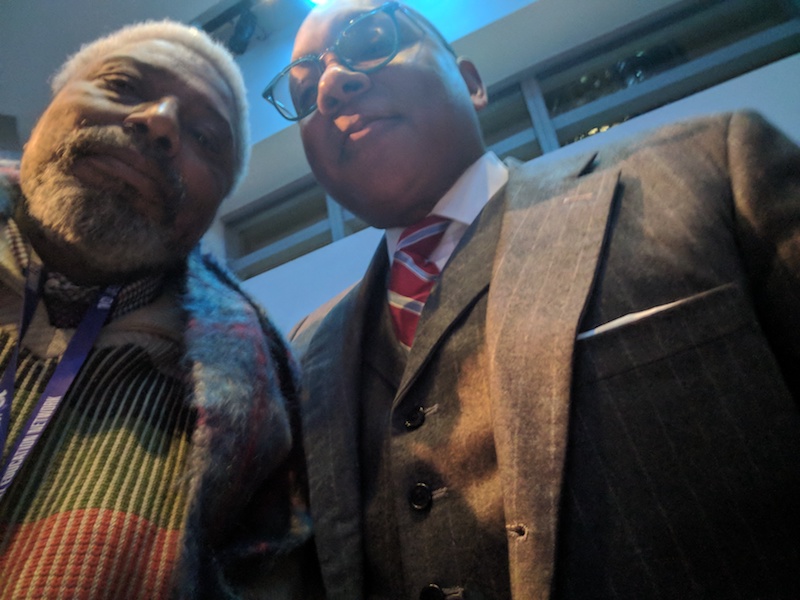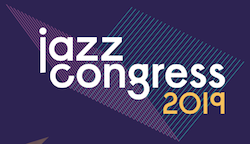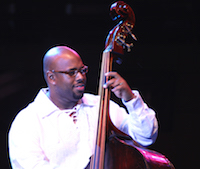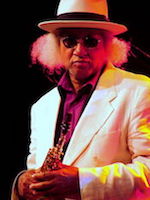
Representing KUCI at Jazz Congress
13 February 2019 Jazz : Not Jazz
(Above: KUCI’s Jazz Director Hobart Taylor and JALC’s Wynton Marsalis)
Represent.
That’s what I did for KUCI and our listeners at the Jazz Congress January 7 and 8 held at New York’s Jazz at Lincoln Center and later that week at NYC’s Winter JazzFest.
 Jazz Congress is a series of meetings,seminars, and presentations, bringing together folks from radio, record companies, promoters, venues and festivals, the press, and artists so that they can network, share strategies to promote jazz, or in jazz speak, “hone their chops and hang”. Over 1,000 participants attended
Jazz Congress is a series of meetings,seminars, and presentations, bringing together folks from radio, record companies, promoters, venues and festivals, the press, and artists so that they can network, share strategies to promote jazz, or in jazz speak, “hone their chops and hang”. Over 1,000 participants attended
Jazz Congress 2019 was held at Jazz at Lincoln Center, a gorgeous venue featuring a a concert hall, smaller performance spaces, studios, and a night club, Dizzy’s, which perches above Columbus Circle.
JALC’s executive director, trumpeter Wynton Marsalis, and JazzTimes magazine publisher Lee Mergner co-hosted the event.
The Panels:
Jazz, Swing, Race and Culture
Moderated by journalist/consultant Andre Guess, this panel danced around the recurrent question, does jazz belong to any one culture, and must it “swing”, that is have clearly defined and syncopated rhythms, to be jazz. Panelists included Wynton Marsalis, bassist Christian McBride, and pianist Myra Melford. Marsalis, working from notes, reiterated his oft stated assertion that racialization of jazz and culture is a trap that abets oppression and marginalizes the music. He noted, as an example, that Celtic music is among the streams flowing into the river of jazz. There was some push back from audience members who stressed the essential “Africaness” of jazz.

Christian McBride
KEYNOTE: Lundvall Visionary Award & Art Blakey Centennial Celebration
Often these awards are inside affairs, featuring behind the scenes folks who keep the wheels turning with little remuneration and less recognition. I don’t know what Darlene Chan was paid, but her name is not the first that occurs to you when you think of the various jazz festivals that have expanded the genre’s reach. Working closely with George Wein, founder of the Newport, JVC, New Orleans Jazz and Heritage festivals among others, Chan is catalyst in the promotion and promulgation of the these concerts, and from her work comes Bill Graham’s concerts, Woodstock and Coachella. She was introduced by Wein, a spry 93 year-old. Following this presentation several artists who had completed their “graduate studies” by apprenticing in one of the multitudinous configurations of Art Blakey’s Jazz Messenger’s took the stage to remember how he taught the nuances that elevate performance to greatness. Most of the artists represented have gone on to become leaders and stars in their rights. Among the notables there were trumpeter Terence Blanchard, Branford and Wynton Marsalis, guitarist Kevin Eubanks, trumpeter Eddie Henderson, trombonist Steve Turre, trumpeter Randy Brecker, saxophonist Gary Bartz, and bassist Reggie Workman. Memories are fragile things, but many of the artists remembered clearly times when they weren’t paid, when they were given doses of tough love, and when they were taken in, encouraged, and made to feel a part of something larger, a tradition, a community.
Musical Inspiration is Everywhere
Composer/pianist Gary Versace and Jazz at Lincoln Center saxophonist Ted Nash conducted a workshop on the integration of “non-musical” experience into musical composition.
Using a speech given by a champion for Indian independence from the 1940’s, they composed on the spot a piece that conveyed the tone of the speech’s delivery, the rhetorical devices used to emphasize points, and the meaning and context of the prose itself. They discussed influences from nature, but most revealing to me, they discussed the power of subtraction…that is to take established musical compositions and to subtract various elements such as steps in chord progressions in order to free up invention. They proceeded to demonstrate the process in a series of improvisations on “Cherokee” that they collaboratively deconstructed into a new and wonderful tune.
Electric Miles Revisited Presented by the Miles Davis Estate

Gary Bartz
Various artists like Gary Bartz (sax), Wallace Roney (trumpet), Dave Liebman (sax), Mtume (percussion), and Lenny White (bass) who collaborated with Miles Davis during his “electric” period, 1969-1975, joined Sirius/XM’s Mark Ruffin and shared stories about Miles and this extraordinary time in his life.They made a strong case for seeing this era as the culmination of the rock revolution and the post jazz movement and the creation of new modern musics that encompass contemporary and future trends.
Conclusion: “The world is always catching up to Miles”.
Alternative Jazz
Cellist Brandee Younger (lately collaborating with Makaya McCraven) moderated a panel that included ubiquitous saxophonist Donny McCaslin, drummer Terri Lynne Carrington,Meshell Ndegocello, and pianist Aaron Parks. They talked about breaking the restraints imposed by clubs, festivals, and radio/streaming platforms that repeat genre classifications in a musical environment where the most creative new artists live in a genre fluid world. They mentioned exceptions like Knoxville. Tennessee’s “Big Ears” Festival.
Jazz in Troubled Times
Vijay Iyer, pianist and thinker, Rene Marie, singer and activist, and Arturo O’Farrill, band leader, educator and activist addressed how the Trump era and historic injustices elicit creative responses to current dilemmas. They stressed that attention to the daily struggles of people gives jazz authenticity. O’Farrill discussed his work with New york city public schools and his delighted surprise in encountering former students years later in professional capacities.
